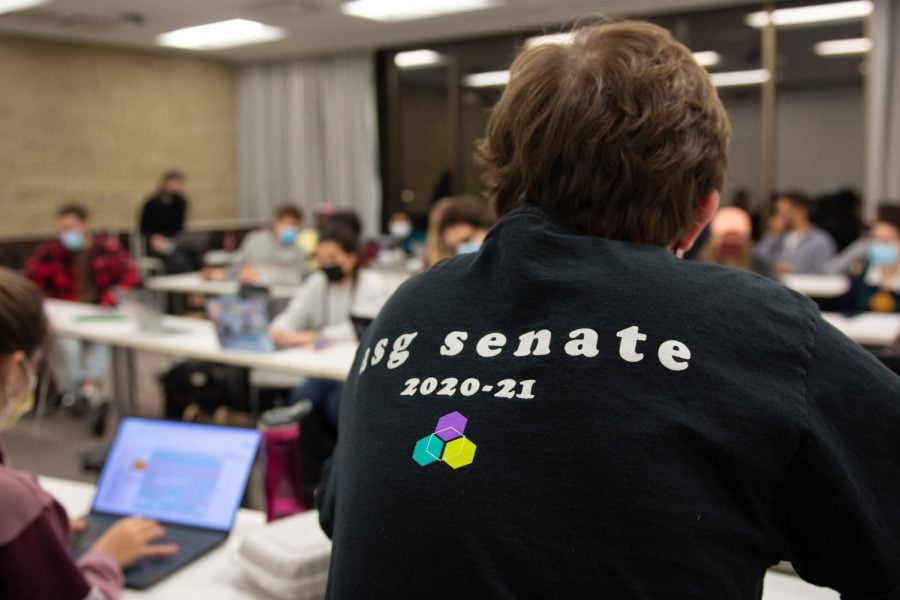ASG passes policy on meeting publicity and journalistic documentation
Daily file photo by Joanne Haner
ASG’s updated code on meeting publicity is meant to make the Senate a safer place for student activists, its leaders say. Some student journalists have spoken out against the new provisions surrounding recording and documenting meetings.
March 10, 2022
Associated Student Government unanimously approved a new policy Wednesday allowing senators to close certain meetings to create a safer environment for student activists speaking up.
The new policy, which amends ASG’s code, was originally introduced and tabled Jan. 6 after backlash from student publication leaders, including The Daily’s editor in chief. Since then, ASG leadership met with student journalists and activists about the policy throughout the quarter before writing the final version.
The code now stipulates two-thirds of senators can vote to make a meeting “private,” meaning nothing said can be reported. Two-thirds can also vote to close a meeting, requiring all non-ASG members to leave. Parliamentarian and SESP sophomore Leah Ryzenman, who heads the committee in charge of the code review, said ASG would provide minutes to journalists for closed meetings, withholding the personal information of speakers.
“This is about how to make sure student activism within ASG can be protected in a way that students can speak and have the freedom to dissent on issues without having this fear that what they say will be blown out of proportion and they will be publicly criticized,” Rules Committee member and Weinberg sophomore Assem Belhadj said. “I don’t think any student deserves to have that in an ASG space.”
The Rules Committee also added a section to its code of ethics about recording and documentation of Senate meetings, which “highly encourages” journalists to ask anyone who speaks for permission before quoting them. ASG can’t tell journalists how to conduct themselves, Belhadj said, but the code describes what it expects of journalists to ensure students feel safe about being quoted.
News Director of Northwestern News Network and Medill junior Andrew Rowan, a former Daily staffer, spoke against the policy at the meeting. He said while he understands the premise behind the procedure to make a meeting “private,” such a ruling wouldn’t be allowed for a civil governing body.
“Senate is an elected body,” Rowan said. “(Its members) control $1.5 million of funding. Just because we are all students, we as journalists shouldn’t cover you in any way different than we would cover any other governing body.”
Medill Dean Charles Whitaker said journalists’ procedures for covering open meetings should be the same for all representative bodies, regardless of whether it’s student government or the federal government.
Typically, journalists can record and document public meetings without permission, following their organization’s individual code of ethics. Whitaker said he believes part of the problem with the code review’s changes is many people don’t know the ethical standards to which journalists adhere.
Whitaker said creating a code of conduct for attendees is acceptable if it doesn’t border on censorship.
“I appreciate the need and desire to protect vulnerable students who may be expressing concerns that make them a target to other members of the community,” Whitaker said. “There has to be a mechanism for allowing those views to be expressed, other than saying that if they are expressed in a public forum, they cannot be quoted. I don’t think that’s appropriate.”
In response to Rowan’s concern, ASG proposed and passed an amendment to the publicity section requiring votes to occur in public sessions.
Belhadj and Ryzenman said the purpose of the new policy is not to censor journalists. Belhadj said it’s not censorship if the intention behind closing a meeting is to protect students. He said it’s up to senators to decide case-by-case whether closing a meeting would constitute censorship or act as means of protecting students.
Ryzenman said ASG’s code is a live document and this policy could be changed in the future. Belhadj added that closing meetings or making them private will be rare.
“It’s very based on limited circumstances, not something that would become common practice,” Belhadj said.
Email: [email protected]
Twitter: @EmmaCRosenbaum
Related Stories:
— ASG workshops amendment to clarify meeting publicity rules
— In ASG session attended by over 200, Senate passes resolution supporting Palestinian human rights


